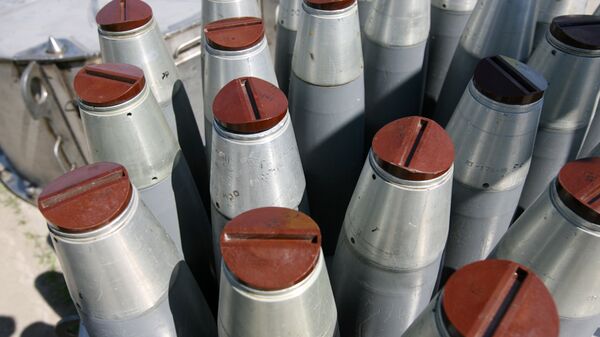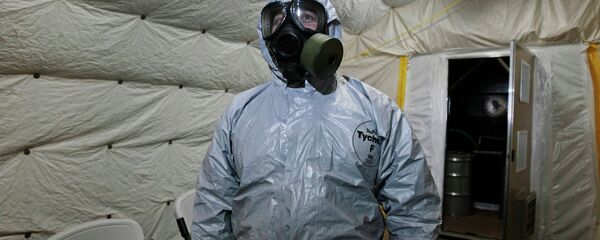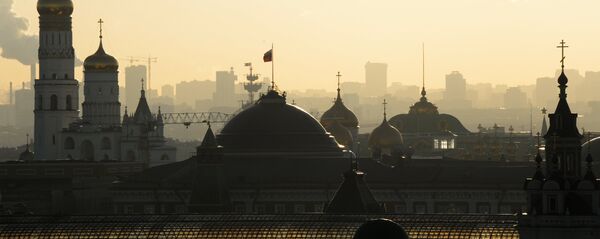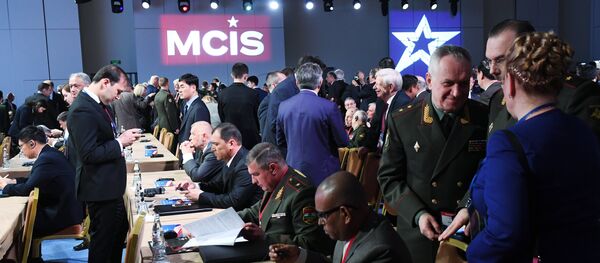MOSCOW (Sputnik) — On January 13, 1993, in Paris, then-UN Secretary-General Boutros Boutros-Ghali opened for signature the Convention that came into effect in 1997.
The CWC is the first multilateral agreement in history that stipulates the elimination of an entire class of weapons of mass destruction during a fixed period.
The Convention, which has an unlimited term, aims to accomplish two major tasks. The first one is the elimination of an entire class of weapons of mass destruction under strict international control (disarmament). And the second one is banning production of chemical weapons and their use (proliferation prevention).
The CWC has been signed by 192 states to date. Myanmar and Angola joined the Convention in 2015.
Israel, North Korea, Egypt and South Sudan are not covered by the Convention. Israel has signed the document but has not ratified it. Russia which had the largest chemical weapons arsenal (40,000 tons) became a full party to the Convention on December 5, 1997.
Signatory states pledge not to develop, produce, or otherwise acquire, stockpile or retain chemical weapons, or transfer, directly or indirectly, chemical weapons to anyone, to use chemical weapons, to engage in any military preparations to use chemical weapons as well as not to assist, encourage or induce, in any way, anyone to engage in any activity prohibited to a State party under this Convention. The countries also promise not to use riot control agents as a method of warfare.
Any state, party to the Convention, has the right to develop, produce, or otherwise acquire, retain, transfer or use toxic chemicals or their precursors for purposes not banned under the CWC such as the industrial, agricultural, research, medical, pharmaceutical or any other peaceful purposes. The signatory states also could possess toxic chemicals for purposes needed for protection from toxic chemicals and chemical weapons. They could also possess such chemicals for military purposes not linked with the use of chemical weapons and the use of them as a means of warfare as well as for law enforcement purposes, including riot control. The Convention’s articles are not subject to any reservations.
The signatory states established the Organization for the Prohibition of Chemical Weapons (OPCW) for monitoring compliance with the convention. The OPCW is based in the Dutch city of The Hague and also serves as an international venue for discussing the CWC implementation.
The OPCW’s governing bodies include the Conference of the States Parties, the Executive Council and the Technical Secretariat. The Conference of the States Parties includes delegates from all signatory states and holds regular annual sessions. And the so-called review conferences are held every five years.
The OPCW Executive Council that reports to the Conference of the States Parties has 41 members elected for two years on rotation. It is headed by a president, elected for 12 months. While establishing the Executive Council, the concerned parties focused on an equitable geographical representation, the significance of member countries’ chemical industries, as well as political interests and security interests. The seats in the Executive Council are distributed among regional groups: Africa and Asia have nine seats; Eastern Europe has five seats, Latin America and the Caribbean region have seven ones, as well as Western European and other states, possess 10 seats. There is also one rotating seat, with countries of the Latin America and Asia groups delegating representatives every two years. The Executive Council holds three regular sessions a year.
The Technical Secretariat that reports to the Executive Council is headed by a director general, appointed by the Conference of the States Parties at the recommendation of the Executive Council for a four-year period. The director general can serve two terms. Turkey’s Ahmet Uzumcu has been serving as the Technical Secretariat's Director General since July 2009, and his second term expires in July 2018. The new director general of the Technical Secretariat is to be elected in December 2017. The Technical Secretariat also includes inspectors, academics, technical, and administrative personnel with the various qualifications needed to implement the Convention's subject matter and goals. The Technical Secretariat conducts verifications and inspections in signatory states to confirm the CWC's provisions, assists the Conference of the States Parties and the Executive Council in executing their functions and fulfills other tasks assigned it by the OPCW’s governing bodies.
Albania, Libya, Iraq, India, Russia, the United States and South Korea are the countries that have officially admitted the possession of chemical weapons.
Under the provisions of the CWC, all chemical weapons in the world were to have been eliminated 10 years after the document’s entry into force by April 29, 2007. This deadline could have been extended to 15 years, until April 29, 2012, by a decision of the signatory states.
Three countries, Albania, South Korea and India, completed their chemical disarmament programs in 2007, 2008 and 2009, respectively.
Due to the fact that three countries holding chemical weapons (Russia, the United States and Libya) failed to eliminate their chemical arsenals by the deadline, participants in the 16th session of the Conference of the States Parties decided to allow these states to independently stipulate the shortest possible deadlines for completely eliminating their chemical weapons stockpiles. Russia announced December 31, 2015 as the final deadline for completing its chemical disarmament program. The United States and Libya set their respective deadlines for September 30, 2023 and December 31, 2016.
As of late 2016, Russia had eliminated some 96 percent of its chemical weapons stockpiles. Under the December 2014 decision of the 19th Conference of the States Parties, the deadline for eliminating Moscow’s chemical weapons was extended to complete work at the Kizner facility in the country’s Udmurtian Republic no later than 2020. This decision was made in the context of objective factors, such as financial issues and toughening of Russian environmental legislation among other issues. As of February 2017, the Kizner facility has eliminated over 76 percent of all stockpiled toxic agents.
The United States that possessed the second largest chemical arsenal of 31,500 metric tons joined the CWC on April 29, 1997 and had eliminated about 90 percent of its toxic agents by late 2016.
Libya, that joined the CWC in 2004, destroyed 31.1 metric tons of mustard gas in February 2014 and launched preparations for eliminating less dangerous chemicals. In 2016, Tripoli said it was impossible to destroy its chemical weapons stockpiles on schedule (December 2016). Taking into consideration the complicated security situation in the African country, and the possibility of seizing the rest of chemical weapons by terrorist groups, a decision to remove these stockpiles from Libya and to eliminate them elsewhere was made. At the same time, Russia insisted that this decision should not violate the CWC and should be conducted under a "Syrian scenario," that is, under a mandatory resolution, due to be passed by the UN Security Council.
Iraq, that joined the CWC in 2009, submitted preliminary data on the composition and structure of declared stockpiles to the OPCW only in October 2011. So far, the country has no clear plan for the destruction of its chemical weapons; nor does it have the required technological or financial resources for accomplishing this task.
Syria signed the Convention on September 14, 2014 and officially joined it 30 days after signing, on October 14, 2013. On June 23, 2014, all chemical weapons components were removed from Syria and destroyed completely in late 2015.







